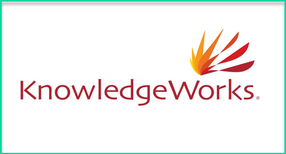
Released today, “Learning on the Block: Could Smart Transactional Models Help Power Personalized Learning?” considers possible impacts blockchain and smart contracts could have on the future of learning. The paper considers both cultural and technology trends to explore four possible scenarios reflecting how blockchain might or might not enable new avenues for personalized learning.
“Blockchain and smart contracts have the potential to help enable new approaches to education,” KnowledgeWorks Senior Director of Strategic Foresight Katherine Prince said. “Specifically, these technologies could enable learners and their families to access experiences and resources across more distributed and diverse learning ecosystems, making learning journeys more personalized and supportive for individual students. Alternatively, they could be used to optimize existing structures and approaches.”
While conducting research for the paper, Prince and co-authors Jason Swanson and Katie King worked with research firm Aperio Insights to run extensive focus groups, inviting experts in blockchain, big data and education to discuss possible intersections between blockchain and learning.
“We wanted to be sure that we had a solid understanding of what blockchain could do, what might not be possible, and what other technologies might be better suited for various purposes. We also wanted to check ourselves in terms of bias and blind spots,” said Swanson, KnowledgeWorks Director of Strategic Foresight.
Each of the four “Learning on the Block” scenarios draws upon this research to explore possibilities ranging from using blockchain to make relatively small operational improvements in a public school district to enabling students to record their learning and access education across a community.
Each of the scenarios reflects how blockchain and smart contracts might intersect with cultural values to enable more or less support for personalized learning. One alarming storyline explores an imaginary future company that creates revenue streams from anonymous student-level data collected through a turnkey product offered to schools.
“It’s important for educators and other stakeholders to think through all possible impacts – both positive and negative – blockchain and smart contracts could have on the future of learning,” said Swanson. “By considering how these technologies may be used, education stakeholders can help steer the conversation about how they might be developed and employed in the future.”
* * * * *
About Knowledgeworks
KnowledgeWorks is a social enterprise focused on ensuring that every student experiences meaningful personalized learning that allows him or her to thrive in college, career and civic life. By offering a portfolio of innovative education approaches and advancing aligned policies, KnowledgeWorks seeks to activate and develop the capacity of communities and educators to build and sustain vibrant learning ecosystems that allow each student to thrive.
Our on-the-ground work includes partnerships with schools through competency education and early college high schools, as well as with communities through StriveTogether. We also provide national thought leadership around the future of learning. For more information on our strategic foresight work, see knowledgeworks.org/future-learning.












